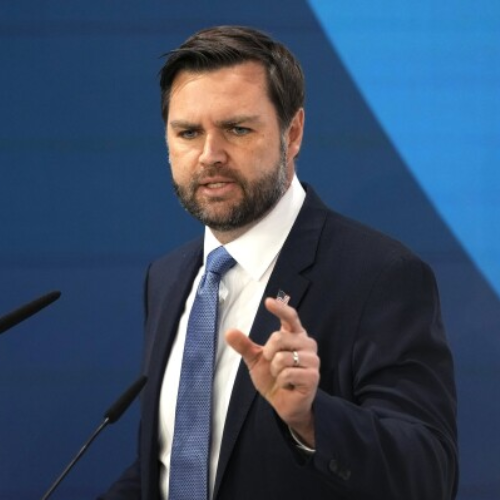JD Vance, the U.S. vice-president, made a controversial speech at the Munich Security Conference that sent shockwaves through Europe and beyond. His address, although focused on the state of European and U.S. relations, exposed deep divides and concerns about the future of the transatlantic alliance. The speech, full of harsh criticism and unapologetic calls for change, left a lasting impression on European leaders and revealed the growing ideological rift between Europe and the U.S.
A Bold Critique of Europe’s Leadership
In his speech, JD Vance didn’t mince words when discussing Europe’s direction. He focused on what he saw as Europe’s failure to address its internal challenges. According to him, the real threat to Europe was not Russia or China, but the “danger from within”—the entrenched political elites who, he argued, had manipulated the system to stay in power. He painted a picture of a Europe that had forgotten its foundational values and was more concerned with protecting the interests of the powerful few rather than listening to the concerns of ordinary citizens.
Vance claimed that Europe’s elites were too focused on issues like migration, multiculturalism, and what he called “woke” politics, and were neglecting the voices of millions of voters who felt ignored and shut out of the political process. He warned that if Europe continued down this path, it risked losing its democratic integrity. His message was blunt: if European leaders didn’t start paying attention to their own people’s concerns, Europe would face a much larger crisis.
Vance Warns Putin: U.S. Will Act Tough on Ukraine with Sanctions and Military Force
He also suggested that Germany, in particular, needed to tear down its metaphorical firewall, which he described as the barriers that stopped the populist right from having a legitimate political voice. Although he didn’t name specific parties, his message was clear: populist movements should be given the opportunity to participate fully in Europe’s political system. He even implied that if Europe failed to embrace these movements, it might not survive in its current form.
The speech wasn’t just about Europe, though. Vance made it clear that the relationship between Europe and the United States was no longer based on shared values. For years, NATO had been the cornerstone of the transatlantic alliance, with the U.S. and European countries working together to defend democratic values against external threats. But Vance questioned whether those values were still the same for both sides.
He argued that if Europe no longer shared the same democratic values as the U.S., then the moral purpose of NATO itself would fade away. He pointed to issues like globalism, migration, and rights for LGBTQ+ individuals as examples of the values that divided Europe and the U.S. He also avoided directly criticizing Russia, which further fueled the perception that Vance was signaling a shift away from Europe in favor of more populist, conservative views.
His speech revealed a growing ideological divide between the U.S. and Europe. The U.S. under the Trump administration, as Vance indicated, was moving away from the idea of being the global leader of democracy and human rights. Instead, the focus was shifting to defending the rights of populist movements, even if those movements were at odds with the values traditionally held by European democracies.
European Leaders Push Back, But the Damage is Done
European leaders were quick to respond to Vance’s remarks, with some offering strong rebuttals. German Chancellor Olaf Scholz reminded Vance of Germany’s history and its commitment to never allowing the atrocities of the past to be repeated. He emphasized that Germany had a duty to fight against any party or movement that tried to legitimize Nazism or glorify its crimes. Scholz made it clear that Germany’s policies on freedom of speech and its firewall against the far-right were not about censorship but about protecting democracy from extremist views.
Elon Musk’s DOGE Sparks Outrage by Leaking Secret Data
Other European leaders, such as Friedrich Merz from the CDU, echoed similar sentiments, asserting that Germany would defend free speech but would not tolerate hate speech or fake news. They also stressed the importance of independent courts and legal systems in maintaining the country’s democracy.
However, despite these rebuttals, the speech revealed a deep divide between Europe and the U.S. The tone of Vance’s remarks suggested that the U.S. was no longer committed to supporting Europe simply because it had always done so. The growing divide was further highlighted by the comments of Ukraine’s President, who noted that the old relationship between Europe and the U.S. was coming to an end. He observed that, unlike in the past, the U.S. no longer seemed to view Europe as a key ally, but more as a market.
The speech at Munich served as a reminder of how much the transatlantic alliance has shifted in recent years. Once a close partnership built on shared democratic values and common security interests, the relationship now seems to be splintering as both sides face new challenges and disagreements over the future of their political systems.


